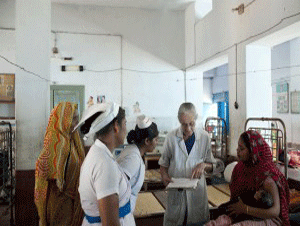Increase in C-Sections worldwide troubles health experts
Sister Gillian Rose runs Bollobhpur hospital in west Bangladesh. She says doctors at private clinics are persuading women to have Caesarean sections even though they may not need them. (Photo: Chantal Anderson)
Story by Chantal Anderson, PRI’s The World. Use audio player above to listen to full report.
In the United States, Caesarean sections have long been common, but rates are now rising fast in many less wealthy nations, including in Asia. The C-section rate in Thailand has reached 34 percent. In Vietnam, it is 36 percent. And in China, nearly half of all births are by C-section.
In Bangladesh, many women who choose C-sections say they do so for convenience and to avoid the pain of childbirth. It is primarily the middle and upper classes that opt for C-sections, but the rate is also rising among the poor.
“That is a complete change,” said Sister Gillian Rose, who runs Bollobhpur Hospital in West Bangladesh.
Rose sees the growing rate of C-sections as a troubling trend. She said one of the reasons more women are having Caesareans is that private doctors at private clinics are telling women they need the surgery when they do not.
“Private clinics are just springing up like the plague with no government regulation, and the doctors basically are getting rich quick,” said Rose.
And while doctors may be profiting, some women may be suffering.
“In settings where surgery is not safe, what we have been seeing is increased risk of hysterectomy and other severe complications,” said João Paulo Souza, an obstetrician for the World Health Organization who has studied the ballooning number of C-sections in developing countries.
Dr. Shams El Arifeen, a senior health researcher in Dhaka, said there is another downside to the booming rate of C-sections in poor countries like Bangladesh. These countries have a limited capacity to provide safe surgical births, so when women undergo unnecessary C-sections, “those who actually need [them] are… being pushed out of that system,” he said.
El Arifeen said in Bangladesh the problem is not the overall rate of C-sections, which stands at 12 percent and falls within WHO recommendations. The problem, he said, is that many women who have C-sections do not need them, and many who do need them go without.
Read more at The World’s website.
——————————————————————————-
PRI’s “The World” is a one-hour, weekday radio news magazine offering a mix of news, features, interviews, and music from around the globe. “The World” is a co-production of the BBC World Service, PRI and WGBH Boston. More about The World.
